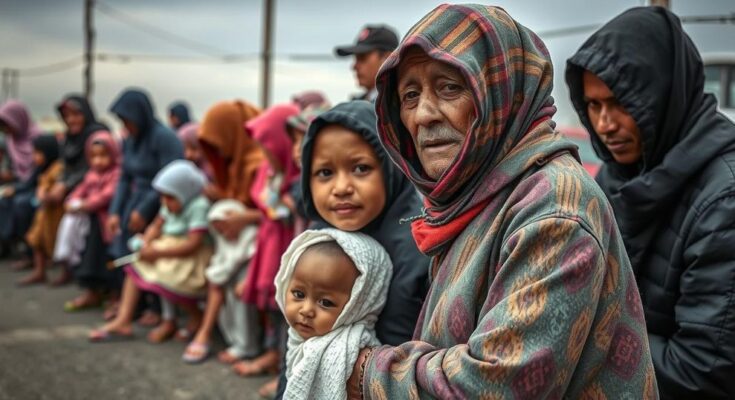The UNHCR report highlights the serious challenges refugees face due to the interplay of climate change and violent conflicts, noting that many displaced persons are in dire conditions. With funding for adaptation severely insufficient, and global temperatures rising, refugees in developing nations are particularly vulnerable. COP29 has initiated funding strategies, yet urgent actions are required to address the growing crisis.
The latest report from the United Nations High Commissioner for Refugees (UNHCR) reveals the alarming intersection of climate-related displacement and violent conflict, forcing refugees into more precarious conditions. Areas such as Sudan, Somalia, and Myanmar exemplify how climate extremes—such as floods and droughts—are exacerbating violent conflicts, pushing individuals to flee. UNHCR chief Filippo Grandi underscored that, “People forced to flee their homes are on the front lines of this crisis,” noting that 75% of refugees reside in developing countries highly susceptible to climate risks. Furthermore, funding remains disproportionately low for the most vulnerable regions, with only $2 allocated per person for adaptation in the most fragile states, compared to $161 in less vulnerable contexts.
The report documented a staggering total of 120 million people displaced due to conflict and 220 million relocated internally due to weather-related disasters. This concerning trend coincides with record global temperatures; 2023 is currently recorded as the hottest year. As NOAA Chief Scientist Sarah Kapnick stated, “Not only was 2023 the warmest year in NOAA’s 174-year climate record — it was the warmest by far.” Consequently, low-income nations are increasingly overwhelmed by the compounded effects of social unrest and climate-induced catastrophes, prompting displacement into areas lacking proper infrastructure, as emphasized by Andrew Harper, UNHCR’s special advisor. “We are seeing across the board, a hellish situation become even tougher,” he remarked, highlighting the urgent need for intervention.
In response, the recent COP29 meeting in Baku has initiated funding strategies for those most impacted, pledging $300 billion by 2035 and a proposed goal of raising $1.3 trillion through various means, including private investment. The UNHCR has articulated objectives focusing on safeguarding the vulnerable and transitioning towards sustainable practices. Najeeba Wazefadost of Refugees for Climate Action asserted, “For us, climate change is not an abstract threat. It is a daily fight for survival, stability and dignity.” She implored leaders to heed the narratives of refugees and implement inclusive measures that promote resilience and empower solutions led by those affected.
The ongoing displacement of refugees is increasingly intertwined with both violent conflicts and climate change. As nations face rising global temperatures and an increase in extreme weather patterns, the United Nations has sought to highlight the essential role these factors play in creating uprooted populations. The report by the UNHCR reflects a broader trend in which the fragile conditions of displaced individuals are compounded by climate crises, making their plight even more urgent.
The situation of refugees amid the dual threats of climate change and conflict is more critical than ever. With unprecedented records of displacement and inadequate funding for those in most need, immediate action from global leaders is necessary to alleviate their suffering and foster resilient communities. The commitments made at COP29 represent a step forward, yet continued efforts are essential to ensure a future where dignity, stability, and survival are attainable for all individuals impacted by these crises.
Original Source: www.thecooldown.com




